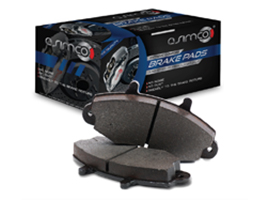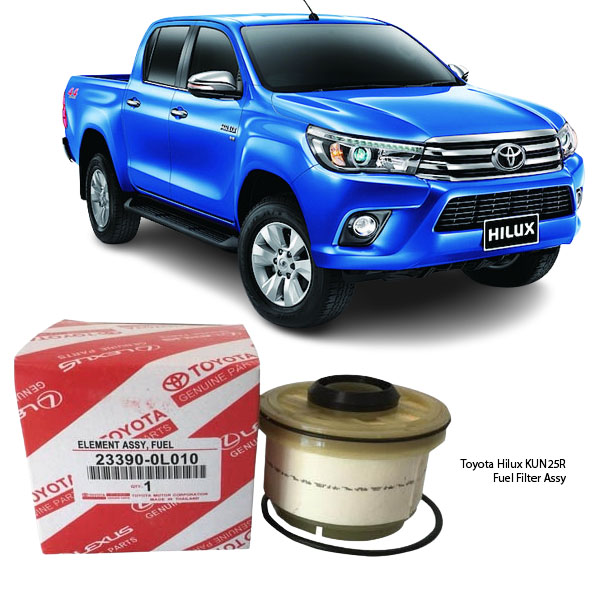-14%
Get Toyota Hilux KUN25R Fuel Filter Assy 23390-0L010 in Kenya
The fuel filter is a critical component in a vehicle’s fuel system, designed to remove contaminants and impurities from the fuel before it reaches the engine. This ensures that clean fuel is delivered to the engine, promoting efficient combustion and optimal engine performance. This article explores the functions, types, importance, and maintenance of fuel filters in vehicles.
Functions of a Fuel Filter
- Contaminant Removal: The primary function of a fuel filter is to trap and remove contaminants from the fuel. These contaminants include dirt, rust particles, debris, and other impurities that can enter the fuel system during storage, handling, or fueling.
- Protection: By removing contaminants, the fuel filter protects critical engine components such as fuel injectors, carburetors (in older vehicles), and fuel pumps from damage and premature wear. Clean fuel ensures proper operation and longevity of these components.
- Maintaining Fuel Quality: A clean fuel filter helps maintain the quality and consistency of the fuel by preventing impurities from entering the engine. This promotes efficient combustion, which is essential for optimizing fuel efficiency and reducing emissions.
- Optimal Engine Performance: Clean fuel free of contaminants ensures that the engine operates smoothly, with consistent power delivery and responsiveness. Proper filtration helps prevent engine hesitation, misfires, and rough idling caused by fuel system issues.
Types of Fuel Filters
- Inline Fuel Filters: These filters are located along the fuel line between the fuel tank and the engine. Inline fuel filters can be mounted inside or outside the fuel tank, depending on the vehicle’s design. They are commonly used in both gasoline and diesel engines.
- Carburetor Fuel Filters: Found in older vehicles with carburetors, these filters are typically small and may be located within the carburetor assembly. They perform the same function of filtering fuel before it reaches the carburetor.
- Fuel Strainer/Pre-filter: Some vehicles have a fuel strainer or pre-filter located inside the fuel tank or near the fuel pump. This filter removes larger particles and debris before the fuel reaches the main fuel filter or injectors.
- Disposable vs. Reusable Filters: Most modern fuel filters are disposable, meaning they are replaced as part of routine maintenance. Some vehicles may have reusable fuel filters that can be cleaned and reused, but this is less common.
Importance of Regular Fuel Filter Maintenance
- Engine Protection: Regularly replacing the fuel filter ensures that contaminants are effectively removed from the fuel before they can cause damage to sensitive fuel system components. This helps prevent clogs, injector issues, and fuel pump failures.
- Fuel System Efficiency: A clean fuel filter promotes efficient fuel delivery and combustion. Proper filtration reduces the risk of fuel flow restrictions, which can lead to poor engine performance, reduced power, and decreased fuel economy.
- Prevention of Costly Repairs: By maintaining a clean fuel filter, vehicle owners can prevent costly repairs to the fuel system. Replacing a fuel filter is a relatively inexpensive maintenance task compared to repairing or replacing damaged fuel injectors or fuel pumps.
- Extended Component Lifespan: Protecting fuel system components with a clean fuel filter helps extend their lifespan. This reduces the frequency of repairs and replacements, saving time and money over the life of the vehicle.
Signs of a Worn or Clogged Fuel Filter
- Engine Stalling or Hesitation: A clogged fuel filter can restrict fuel flow to the engine, leading to engine hesitation, stumbling, or stalling, especially during acceleration or under load.
- Difficulty Starting: If the fuel filter is severely clogged, it may prevent sufficient fuel from reaching the engine during startup, causing prolonged cranking or difficulty starting the vehicle.
- Reduced Engine Performance: A decrease in engine power, poor acceleration, or sluggish throttle response may indicate insufficient fuel supply due to a clogged fuel filter.
- Engine Misfires: Insufficient fuel flow caused by a clogged filter can lead to engine misfires, where cylinders do not receive the correct amount of fuel for combustion, resulting in rough idling or vibrations.
Fuel Filter Maintenance and Replacement
- Regular Inspection: Check the manufacturer’s recommended maintenance schedule for fuel filter replacement intervals. Inspect the filter for signs of dirt buildup, corrosion, or damage during routine inspections.
- Replace as Recommended: Follow the manufacturer’s guidelines for replacing the fuel filter at specified mileage or time intervals. This ensures that the filter continues to effectively remove contaminants from the fuel.
- Use Quality Filters: Choose high-quality fuel filters that meet or exceed OEM specifications. Quality filters offer better filtration efficiency and durability, providing reliable protection for the fuel system components.
- Proper Installation: Ensure the new fuel filter is installed correctly according to the manufacturer’s recommendations. Use new seals or gaskets as needed to prevent fuel leaks and ensure a secure fit.
- Dispose of Used Filters Properly: Dispose of used fuel filters according to local regulations. Many automotive service centers accept used filters for recycling or proper disposal.
Follow us on Facebook for more parts.



